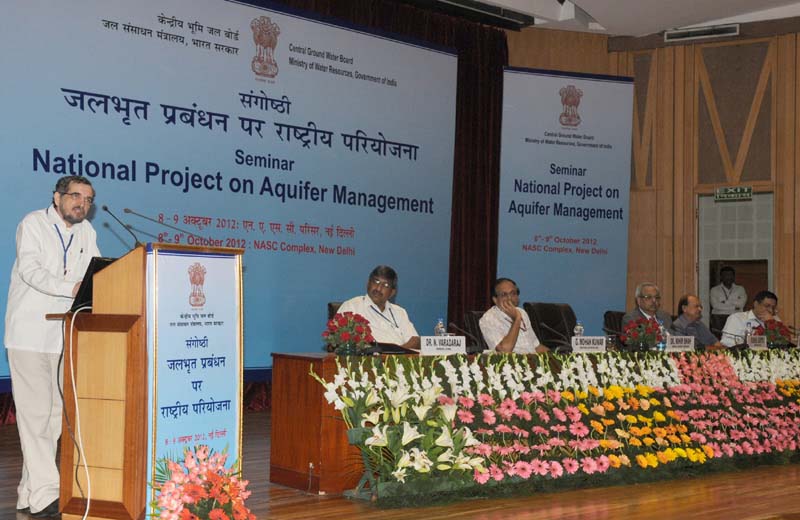/topics/deep-aquifers
Deep Aquifers
The APWELL Project: Andhra Pradesh's experience with participatory hydrological monitoring
Posted on 18 Dec, 2012 02:04 PMPreventing groundwater abuse depends on the users' knowledge of what constitutes this over-exploitation and abuse, and why it is undesirable. The success of APWELL, therefore, depends on participatory hydrological monitoring in which the users were trained in basic hydrology and charged with monitoring the hydrological balance of the watershed.
Ajit Pawar reinstated as Maharashtra deputy CM, despite being involved in a multi-crore irrigation scam - Roundup of the week's news (December 10 – 16, 2012)
Posted on 17 Dec, 2012 09:42 PMAjit Pawar reinstated as deputy CM of Maharashtra
Seminar by CGWB on National Project on Aquifer Management stresses the need for a paradigm shift in groundwater sector from development to management
Posted on 10 Dec, 2012 05:39 PM
Inaugural session chaired by Dr. Mihir Shah
Image courtesy: www.readandknow.org
Highlights from the 10-year water policy research programme of the International Water Management Institute and the Sir Ratan Tata Trust discussed at the IWMI - TATA Annual Partners' Meet at Anand, between 28-30 November, 2012
Posted on 05 Dec, 2012 02:06 PMIWMI-Tata water policy research programme is a collaborative initiative between the International Water Management Institute (IWMI) and the Sir Ratan Tata Trust (SRTT).
Water for cities - Responding to the urban challenge – Technical papers from the Third National Groundwater Congress by CGWB
Posted on 01 Dec, 2012 08:59 AMDeliberations in the Congress organized by the Central Ground Water Board (CGWB) at New Delhi on March 22-23, 2011 focused on various issues viz., Integrated Water Resource Management, Artificial Recharge to Groundwater, Water Use
Kerala and Karnataka's lesser known rainwater harvesting structures
Posted on 16 Oct, 2012 03:09 PMMadakas are one of the fast disappearing traditional rainwater harvesting structures found in the laterite belts of Karnataka and Kerala. They are naturally occuring depressions with high terrain on the three sides where water from the surrounding laterite slopes, mainly runoff from the rains, is accumulated.

Spring water recharge programme: A study of the post-programme impact in the Kumaon region of Uttarakhand by CHIRAG
Posted on 12 Oct, 2012 07:43 PMCHIRAG has been working in the Kumaon area for the last 25 years, and is working on recharge springs.
Surangas, the disappearing lifeline of the farmers of Kasargod, Kerala
Posted on 10 Oct, 2012 09:22 AMSurangas continue to be one of the relatively less known and gradually disappearing traditional water harvesting systems of Kasargod district, Kerala and are being gradually replaced by borewells to meet the water needs of the community.
Spring clusters of Doon valley: Extensive modification of the environment has taken place due to human intervention in the Doons
Posted on 01 Oct, 2012 11:11 AMDoon valley is known for its spring clusters. The mountain flanks of the Doon valley have a chain of swamps. Extensive aquifers of Doon spring clusters provide significant/sufficient storage of water. These spring clusters have hydrological effects such as promoting ground water recharge, intercepting rain and storing rain water.
Aquifer systems of India - Atlas compiled by the Central Ground Water Board (2012)
Posted on 29 Sep, 2012 07:26 PMThe Central Ground Water Board (CGWB) under the Ministry of Water Resources has released a publication entitled “Aquifer systems of India” apart from aquifer atlas for six states viz. Kerala, Tamil Nadu, Karnataka, Chhattisgarh, Himachal Pradesh and Meghalaya.





